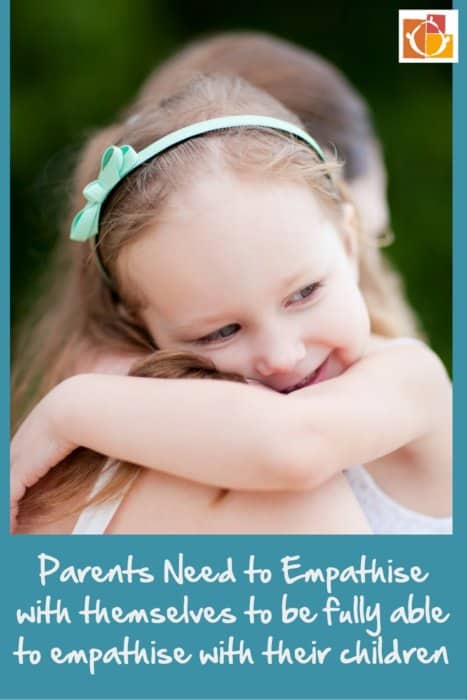![]()
Your son just throttled your baby on the head. The baby is screaming. You hoist her up, and scream at your child. “Why did you do that?!”
He starts crying, so now there's two of them bawling.

You messed up. You overreacted. You already yelled when your daughter emptied the diaper bag.
You forgot Jimmy was supposed to be in sports uniform today.
You are always late. You are so unorganised. You look old. You have no control here anymore.
You push your kids away when they need you most. They need you and you scream at them.
You are a TERRIBLE parent.
There's a dizzying list of things we, as parents, beat ourselves up over. And that negative voice in your head just gets get louder and louder.
So, no wonder you blow your top when your child acts out.
Voices That Guide
Now, it's time to give yourself a break. The reason you blow is not your fault. Not really.
“We blow up at our children, because our parents blew up at us,” says Patty Wipfler, founder of Hand in Hand Parenting. “So that when we can’t think, out comes the behaviour that was imprinted on us.”
But parents judge themselves too harshly.
“The harshness that we’re working so hard to avoid with our children goes for us too,” says psychologist and family therapist Dr. Lawrence Cohen. His takeaway?
Parents need to show themselves empathy before they can extend it to their children
Unfortunately, most of us don't have that script. And the reason for that is simple. No-one ever showed it to us.
“Many of us lack that inner voice of love and compassion,” Cohen told Wipfler. “A lot of us are specifically didn’t get enough of that growing up.
But we can learn to be gentle on ourselves if we go slow and steady. Repeat the following steps, and you could knock that negative voice on it's head.
Start With Caring: After Your Mess Up
Here's what do immediately after upsets happen at your house. The moment where you want to strike out, scream and yell.
First, take a moment. Give yourself a physical and mental “timeout.”
“Give yourself a butterfly hug,” says Cohen, “Or pat, pat, pat your heart like how you'd pat a baby.”
As you do that, try and welcome every feeling you have rather than reacting to them. There are no “bad feelings.” Each is relevant and equally weighted. This thinking will mean a big shift for most of us who grew up without having our feelings welcomed by parents.
Now tell yourself something comforting, compassionate, simple and kind, something like:
- Oops!
- It’s normal.
- You're not bad.
- We learn from mistakes.
- It's ok.
This brief “timeout,” allows you to think and lets you feel empathy so that you move towards your child when you try and resolve the situation.
If you feel yourself getting heated as you offer comfort, try repeating the phrases that resonate most with you.
Do not hurry to find a solution
For the method to work, “It’s crucial not to skip to “I have to know what to do, and to do the right thing,” when upsets happen, says Cohen. Instead, keep in mind why their behavior sends you spinning. Brewing on this moves you into a longer term empathy plan.

A Long-Term Empathy Plan
It's actually not a bad thing to feel terrible about your parenting. “It’s a sign we are living out of line with our deepest values. If it didn’t matter to us, it would mean we didn’t care,” says Cohen.
In fact, these feelings as a starting point to feeling better. Long-term relief comes through thought and questioning around the values. You'll get to a place where you understand your triggers and how to transform them. Here's a 4-step plan for continued growth:
Think: When you are enraged, note it and think, why? “When my older child hits my younger child out of the blue why does that bother me?
Ask: Go deeper. Ask what does my reaction say about my values?”
Establish: Now work on where that value came from? Do you have a role model that helped established that? Why was it so powerful for you? If you are triggered when siblings fight, does it come because you value love or peace, happiness and compassion? Or family bonds? Why is that so important? How did that seed get planted?
Reassert that Value: Add photos of your role model at home, or stick up quotes defining your values. Keeping them in view will strengthen them in your mind.
By tracing these feelings, you gain a deep understanding into why you blow up when your values get crossed. You'll anticipate them, lean in to them and learn new reactions to them.
When you combine this short-term plan with the long-term plan over and over, a new calming, compassionate, and forgiving voice replaces the negative.
Says Dr. Cohen: “Values have a rich, deep history. Tracing them will transform how you act as a parent today, and for the road ahead.”
Hear Lawrence Cohen and Patty Wipfler talk more about When We Mess Up As Parents and solutions that will help.
From the Hand in Hand Toolbox:
Read how Listening Partnerships help parents trace triggers that get them mad
Our self-guided course Building a Listening Partnership is on sale now for just USD 9! (Usual price, $89). Make the most of your listening time!
Learn the secret to handling your child's tantrums
For your complete calm parenting toolbox buy the book Listen: Five Simple Tools To Help You Meet Your Everyday Parenting Challenges
